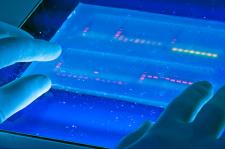Should We Synthesize A Human Genome?
By Drew Endy and Laurie Zoloth,
DSpace@MIT
| 05. 10. 2016
At Harvard today an invitation-only group of mostly scientists, lawyers, and entrepreneurs, ~150 in total, met to discuss if and how to synthesize from scratch an entire human genome – the heritable genetic material that in nature is transferred from parents to children. The meeting was originally organized to focus on “deliverables and industry involvement” with the primary goal of the project being “to synthesize a complete human genome in a cell line within a period of ten years.”
Synthesis refers to the construction of a genome starting from simple chemicals. Such a synthetic genome could then be tested in a laboratory by replacing the existing genome within a human cell. All this would still be far removed from making a synthetic human. However, the possibility of making a human cell whose genome is realized from only digital information and raw materials should trigger broader considerations.
...
Returning to our primary question, just because something becomes possible, how should we determine if it is ethical to proceed?
Continue reading at DSpace@MIT...
Image via Flikr/University of Michigan School of Natural...
Related Articles
By Alex Polyakov, The Conversation | 02.09.2026
Prospective parents are being marketed genetic tests that claim to predict which IVF embryo will grow into the tallest, smartest or healthiest child.
But these tests cannot deliver what they promise. The benefits are likely minimal, while the risks to...
By Steve Rose, The Guardian | 01.28.2026
Ed Zitron, EZPR.com; Experience Summit stage;
Web Summit 2024 via Wikipedia Commons licensed under CC by 2.0
If some time in an entirely possible future they come to make a movie about “how the AI bubble burst”, Ed Zitron will...
By Arthur Lazarus, MedPage Today | 01.23.2026
A growing body of contemporary research and reporting exposes how old ideas can find new life when repurposed within modern systems of medicine, technology, and public policy. Over the last decade, several trends have converged:
- The rise of polygenic scoring...
By Daphne O. Martschenko and Julia E. H. Brown, Hastings Bioethics Forum | 01.14.2026
There is growing concern that falling fertility rates will lead to economic and demographic catastrophe. The social and political movement known as pronatalism looks to combat depopulation by encouraging people to have as many children as possible. But not just...




